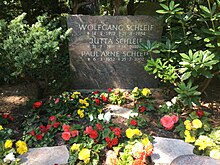Wolfgang Schleif
Wolfgang Schleif (born May 14, 1912 in Leipzig , † August 21, 1984 in Berlin ) was a German film editor , film director and screenwriter .
Life
Wolfgang Schleif studied philosophy, education and psychology at the University of Leipzig . In 1934 he passed the state examination for teaching at the elementary school. But then he took lessons at the drama school of the Deutsches Theater in Berlin, where he trained in directing.
From 1935 he worked in film, from 1938 as an assistant director , from 1939 as a screenwriter and finally as an editor. Among other things, he was responsible for editing the propaganda films Jud Suss (1940) and Kolberg (1945). Nevertheless, Schleif was taken over by DEFA in 1947 . In 1948 he directed the anti-capitalist production Grube Morgenrot for the first time, followed in 1949 by Johann Friedrich Böttger's film biography Die Blaue Schwerter .
After June 17, 1953 , Schleif went to West Germany. With the children's and homeland film Die Mädels vom Immenhof in 1955 he achieved an extraordinary success, which for years also focused his work on the staging of such materials. He shot several hit films with Freddy Quinn in the spotlight, but also war films like Rommel calls Kairo and crime films like Der Rote Rausch and, in the early 1970s, the Immenhof stragglers Die Zwillinge vom Immenhof and Frühling auf Immenhof .
Since the mid-1960s, Schleif worked intensively for television. He has often directed series and multi-part films, particularly the five-part Russian Civil War (1967).
He was buried in the Dahlem forest cemetery.
Filmography
- 1948: Morgenrot pit
- 1948: good luck!
- 1949: The blue swords
- 1949: ... and if it were only one ... (also co-script)
- 1950: Sour Weeks - Happy Holidays (also co-script)
- 1953: The Troublemakers
- 1954: Ännchen von Tharau (also co-script)
- 1955: my children and me
- 1955: The girls from Immenhof (also co-script)
- 1955: heroism after the store closes
- 1956: Tender secret
- 1956: The girl Marion (Prize of Nations)
- 1957: blue boys
- 1957: Made in Germany - a life for Zeiss
- 1957: The botched wedding night
- 1958: A journey into happiness
- 1959: Freddy, the guitar and the sea
- 1959: Freddy under strange stars
- 1959: The blue moth
- 1959: Rommel calls Cairo
- 1960: Freddy and the melody of the night
- 1960: The way is long
- 1961: You have to be blonde on Capri
- 1961: Oh Egon!
- 1962: The Devil of Cape Town ( Sfida nella città dell'oro )
- 1962: The red intoxication
- 1962: Aurora Marriage Institute
- 1962: Between Shanghai and St. Pauli
- 1963: Holidays like never before
- 1964: The blue of the sky
- 1964: Operation carrier pigeon - fates in divided Berlin
- 1965: The Forellenhof (series)
- 1965: Beware of gray temples
- 1965: Jean
- 1965: The Michael Reiber case
- 1965: The Harry Domela case
- 1966: Season in Salzburg
- 1966: In the nest of the yellow viper (FBI operazione vipera gialla)
- 1966: Rosemary
- 1967: Civil War in Russia (five-part series)
- 1967: Mr. Schrott is recovering
- 1967: Slatin Pasha
- 1967: The Remagen Bridge
- 1968: The Wera Sassulitsch case
- 1969: Sir Basil Zaharoff - Agent of Death
- 1969: Queen of One Night
- 1969: The Irish struggle for freedom
- 1970: Hurray, our parents are not there
- 1970: My Daughter - Our Miss Doctor (series)
- 1970: Tour (series)
- 1972: With the flow
- 1972: The enemy of marriage
- 1972: My Brother - Der Herr Dokter Berger (series)
- 1972–1973: Algebra at eight (series)
- 1973: The Twins from Immenhof (also co-script)
- 1974: Spring at Immenhof (also co-script)
- 1974: cheerful to meschugge
- 1974: Under one roof (series)
- 1975: Homicide Squad (series)
- 1975: No Police, Please (series)
- 1977: Mr. Carlis and His Adventurous Stories (series)
- 1979: like smoke and dust
- 1979: The Koblanks (series)
- 1979: Commissariat IX (series)
- 1981: Those were the days - little stories from Kalke & Söhne
- 1981: O you happy - contemplative Christmas stories
- 1981: Station Stories (series)
Web links
- Wolfgang Schleif in the Internet Movie Database (English)
- Wolfgang Schleif at filmportal.de
| personal data | |
|---|---|
| SURNAME | Schleif, Wolfgang |
| BRIEF DESCRIPTION | German film editor, film director and screenwriter |
| DATE OF BIRTH | May 14, 1912 |
| PLACE OF BIRTH | Leipzig |
| DATE OF DEATH | August 21, 1984 |
| Place of death | Berlin |
